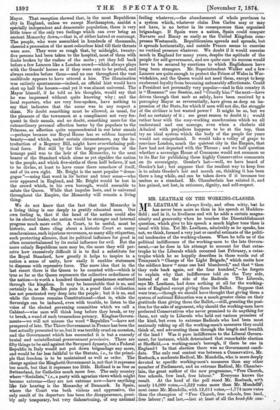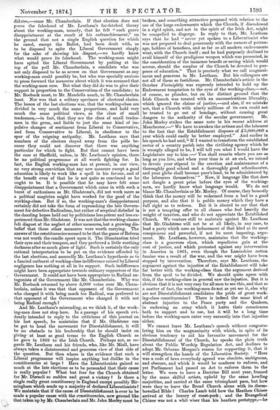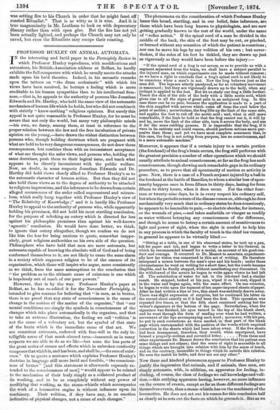MR. LEATHAM ON THE WORKING-CLASSES.
AIR. LEATHAM is always lively, and often witty, bat he has never been more so than in his speech at Rudders- field; and in it, to liveliness and wit he adds a certain magna- nimity and generosity when he touches the Disestablishment question, which give to his speech a much higher tone than is usual with him. Yet Mr. Leatham, admirably as he speaks, has not, we think, formed a very just or careful estimate of the politi- cal tendencies of the working-classes. When he tells us of the political indifference of the working-men to the late Govern- ment,—as he does in his attempt to account for that catas- trophe to the Liberals which occurred last February, a catas- trophe which he so happily describes in those words out of Tennyson's "Charge of the Light Brigade," which recite how the soldiers knew "some one had blundered," and that "then they rode back again, not the four hundred,"—he forgets to explain why that indifference told ,on the Tory side, instead of on the side of the Radicals. The Liberals, says Mr. Leatham, had done nothing at all for the working- men of England except giving them the Ballot. Suppose that were true,—though we should have thought that giving them a system of national Education was a much greater claim on their gratitude than giving them the Ballot,—still, granting the posi- tion for the sake of argument, why should the working-men have preferred Conservatives who never promised to do anything for them, not only to Liberals who held out various promises of the kind, but even to extreme Radicals who had been most anxiously raking up all the working-men's measures they could think of, and advocating them through the length and breadth of the land Was it pure indifference to the Liberal Govern- ment, for instance, which determined that remarkable election at Sheffield,—a working-man's borough, if there be one in England In that election there was no Government candi- date. The only real contest was between a Conservative, Mr. Roebuck, a moderate Radical, Mr. Mundella, who is more deeply devoted to specific working-men's measures than any other member of Parliament, and an extreme Radical, Mr. Chamber- lain, the great author of the new programme, "Free Church, free schools, free land, free labour." Everyone knows the result. At the head of the poll stood Mr. Roebuck, wikh nearly 14,000 votes,-1,322 votes more than Mr. Mundellit; next came Mr. Mundella, with 12,611 votes,-1,774 more votes than the champion of "Free Church, free schools, free land, free labour ;" and last,—last at least of all the bond-fide can- didates,—c.ame Mr. Chamberlain. If that election does not prove the falsehood of Mr. Leatham's far-fetched theory about the working-man, namely, that he felt "such grave disappointment at the result of his enfranchisement," on the ground that not a single English question for which he cared, except the Ballot, had been dealt with, as to be disposed to spite the Liberal Government simply for the sake of showing his disgust,—we hardly know what would prove its falsehood. The working-man might have spited the Liberal Government by putting at the top of the poll Mr. Chamberlain, a candidate who was not only disposed to be as severe on that Government as any working-man could possibly be, but who was specially anxious to press forward the measures about which it was assumed that the working-men care. But what they did do was to give their support in proportion to the Conservatism of the candidate ; to Mr. Roebuck most, to Mr. Mundella much, to Mr. Chamberlain least. Nor was that a solitary specimen of electoral choice. The lesson of the last elections was, that the working-class are divided in very much the same proportions, and hold very much the same political views, as the class of small tradesmen,—in fact, that they are the class of small trades- men in the germ, and liable to just the same kind of im- pulsive changes of sentiment from Liberal to Conservative, and from Conservative to Liberal, in obedience to the spur of the reigning antipathy. Mr. Leatham says that numbers of the electors stayed away from the polls be- cause they could not discover that there was anything particular for which to fight. But that cannot have been the case at Sheffield, unless, in Mr. Leatham's opinion, there be no political programme at all worth fighting for. In fact, the English working-man has at present, in our view, no very strong conviction that any new measure except a good education is likely to work like a spell in his favour, and of the benefit even of that he is not quite as convinced as he ought to be. It is possible that he may have felt some disappointment that a Government which came in with such a burst of enthusiasm as Mr. Gladstone's, did not work more as a political magician might have worked for the good of the working-class. But if so, the working-man's disappointment certainly did not take the form of reproaching the late Govern- ment for defective Radicalism, but rather of sceptical disbelief in the dazzling hopes held out by politicians less potent and less ex- perienced than Mr. Gladstone. It was not that the working-classes felt disgust at the neglect of other measures, but a growing dis- belief that those other measures were worth carrying. The answer of the constituencies seemed to be that the game of Reform was not worth the candle spent upon it. The illumination tried their eyes and their tempers, and they preferred a little soothing darkness after so much glare of light. Such is certainly the only rational interpretation to be put on the evidence afforded by the last elections, and assuredly Mr. Leatham's hypothesis as to a fancied outburst of working-class indifference caused byLiberal negligence has nothing at all in its support. Such indifference might have been appropriate towards ordinary supporters of the
, Government. It could not have been appropriate to Radical an- tagonists of the Government like Mr. Chamberlain. Why was Mr. Roebuck returned by above 3,000 votes over Mr. Cham- berlain unless it was that that opponent of the Government who charged it with being much too Radical, was preferred to that opponent of the Government who charged it with not being Radical enough?
And Mr. Leatham's misreading, as we think it, of the work- ing-men does not stop here. In a passage of his speech evi- dently intended to reply to the criticisms of this journal on his last speech, he maintains that if Mr. Gladstone can be got to head the movement for Disestablishment, it will be no obstacle to his leadership that he should insist on giving at least as good terms to the Eiwlish Church as he gave in 1869 to the Irish Church. Perhaps not, as re- gards Mr. Leathern and his friends, who, like Mr. Miall, have always taken a disinterested and generous view of that side of the question. But then where is the evidence that such a Liberal programme will inspire anything but dislike in the constituencies at large? Have the Liberationists gained so much at the late elections as to be persuaded that their cause is really popular? What but fear for the Church obtained for Mr. Disraeli so sudden and great a victory? Is there a single really great constituency in England except possibly Bir- mingham which sends up a majority of declared Liberationists! We maintain that if the cause of Disestablishment is ever to be made a popular cause with the constituencies new ground like that taken up by Mr. Chamberlain and Mr. John Morley must be broken, and something attractive proposed with relation to the use of the large endowments which the Church, if disendowed in a rigid spirit, and not in the spirit of the Irish Act, might be compelled to disgorge. In reply to that, Mr. Leathern says that he had "never yet spoken to a Liberationist who was not prepared to deal generously with the owners of patron- age, holders of benefices, and as far as all modern endowments went, with the Church itself ; and he had purposely declined to avail himself of the prodigious weapon which was presented, in the consideration of the immense benefit or saving which would accrue, should the surplus of the Church be devoted to pur- poses of education." That is precisely what we call magnani- mous and generons in Mr. Leathern. But his colleagues are not all of them so fastidious. Mr. Chamberlain's article in the October Fortnightly was expressly intended to hold up the Endowment temptation to the eyes of the working-class,—not, of course, as plunder, but on the distinct ground that the Irish Church was treated with an unconscientious liberality, which ignored the claims of justice,—and also, if we mistake not, that a Church with ninety millions of its own could not be trusted to go out of bondage, without causing great dangers to the authority of the secular government. Mr. John Morley strikes the same note in his recent address at Manchester,—" We have to awaken the artisan and the labourer to the fact that the Establishment disposes of £5,000,000 a year which could easily be better employed." And earlier in his speech he had said," If I wanted to transform the established rector of a country parish into the civilising agency which he is wrongly alleged to be, I will tell you what I would have the
Legislature say to him You shall remain where you are as long as you live, and when your time is at an end, we intend to devote your stipend to the erection and maintenance of a thoroughly good school and a thoroughly good schoolmaster, and your glebe shall become poor's land, to be administered by the labourers themselves." Now, if language like that does not dangle a great prize before the eyes of the workingr men, we hardly know what language would. We do not blame Mr. Chamberlain or Mr. Morley. Of course, they honestly think that the money will be redeemed from a bad to a good purpose, and also that it is public money which they have a full right so to redeem. But it is absurd to say that that is not a tempting offer to all classes who feel heavily the weight of taxation, and who do not appreciate the Established Church. We venture still to maintain against Mr. Leathern that Mr. Gladstone will not be at all likely, in any case, to lead a party which uses an inducement of that kind as its most conspicuous and powerful, if not its most imposing, argu- ment. Mr. Leathern, however, maintains that the working- class is a generous class, which repudiates gain at the cost of justice, and which protested against any intervention in America in 1861, even though the Lancashire cotton famine was a result of the war, and the war might have been stopped by intervention. Therefore, says Mr. Leathern, the argument against the injustice of the Establishment will take far better with the working-class than the argument derived from the spoil to be divided. We should quite agree with this, if the working-class in general saw the injustice. But it is obvious that it is not very easy for all men to see this, and that as a matter of fact, the working-men do not as yet see it, else why are not Disestablishment candidates the pride of great work- ing-class constituencies There is indeed the same kind of abstract injustice to the Peace party and the Quakers, in endowing an army which it hurts their consciences both to support and to use, but it will be a long time before the working-men enter very earnestly into that injustice either.
We cannot leave Mr. Leatham's speech without congratu- lating him on the magnanimity with which, in spite of its obvious tendency to aid his favourite movement for the Disestablishment of the Church, he speaks the plain truth about the Public Worship Regulation Act, and declines to adopt Mr. Osborne Morgan's reason for supporting it, that it will strengthen the hands of the Liberation Society. "Here was a code of laws everybody agreed was obsolete, ambiguous, and obscure, and which it would be madness to enforce, and yet Parliament had passed an Act to enforce them to the letter. We were to have a Doctrine Bill next year, framed by the same skilful artiste, upheld by the same howling majorities, and carried at the same triumphant pace, but how were they to leave the Broad Church alone with its disem- bowelled Bible I Charles Lamb told how the Heathen Chinee
arrived at the luxury of roast-pork ; and the Evangelical Chinee was not a whit wiser than his heathen prototype,—he
was setting fire to his Church in order that he might feast off roasted Ritualist." That is as witty as it is wise. And it is true magnanimity in Mr. Leathern to look on with deprecatory dismay rather than with open glee. But the fire has not yet been actually lighted, and perhaps the Church may not only be saved, but eyen the Ritualists may escape their roasting.




































 Previous page
Previous page